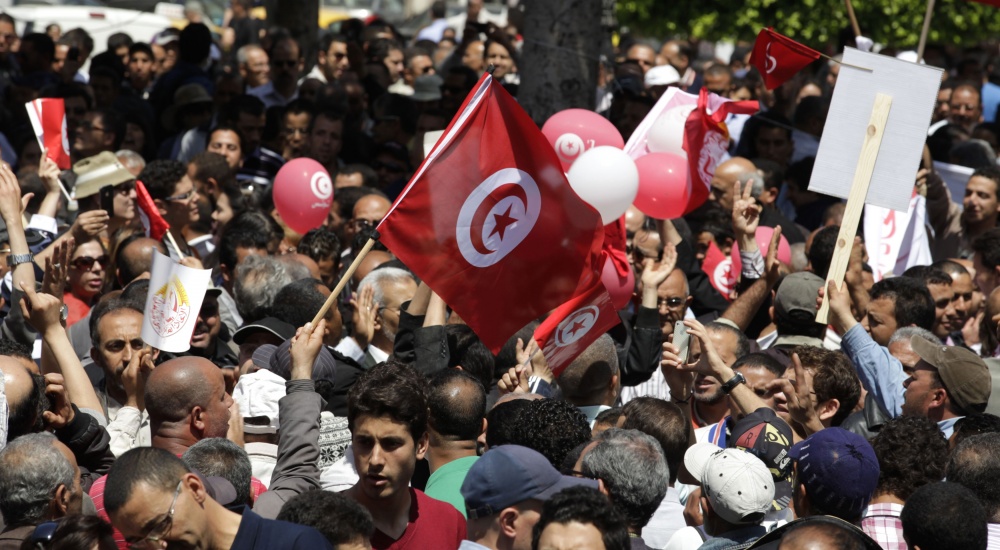Professors from the nation’s public universities are preparing to stage demonstrations Tuesday, March 23, to protest salary shortfalls and on-campus government security interventions, and to demand institutional independence. A one-hour cessation of classes at 11 AM will accompany the protests, which were called by ten university faculty staff clubs during a joint meeting on March 11.
The demonstrations will mark exactly two years since 23 March 2008, when thousands of professors and activists gathered to make similar demands and a one-day cessation of classes was observed at most universities.
Disheartened university staff say that agreements reached with the government since the March 2008 strikes have had little result.
"We were demanding pay raises, raises in research budgets and institutional independence. The outcome was that [the government] came up with a half-cooked plan to give professors not proper raises, but what they called a ‘performance raise,’" scoffed Laila Soueif, a professor of mathematics at Cairo University. "It was accepting a bad deal, rather than no deal."
During negotiations prompted by the 2008 protests, the Ministry of Higher Education proposed to raise university professors’ monthly salaries–which usually range from LE1,500 to LE6,000–by an additional LE2,000 to LE3,000, provided that professors conformed to new "performance-based" policies, which included being on campus for a minimum of 28 hours a week and regularly filling heavy paperwork. Assistant professors, who make between LE1,000 and LE2,000 a month, were given raises of LE500/month, without any required paperwork, according to Soueif.
At Cairo University, roughly one third of the professors opted to register for the new performance-based system, but say they are now facing six months of overdue payments.
"Since then, it has been, ‘Is the money coming, isn’t it coming?’" said Soueif. "The whole scene has been dominated by these petty concerns."
According to Dr. Abdel Gelil Mostafa, a professor of medicine at Cairo University, the government-proposed system is illogical. "[The Minister] made this move, which is not healthy, which is illegal, which is not constitutional, and which does not solve the problem of the low salaries," he said. "When you have a low salary, the solution is that it should be raised, reasonably raised. And then you should be asked to do your work the right way–and if you don’t, then you can be questioned."
At a meeting attended by several of the boards of university faculty staff clubs on March 16, Ministry of Higher Education officials described the current performance-based system as effective, but acknowledged there were some problems with payments this year, which the ministry promised to overcome.
Professor of Medicine at Mansoura University and member of the Muslim Brotherhood (MB) opposition movement Dr. Tarek el-Desouky stressed that, while faculty members with political links to the MB would likely participate in the planned strike, the movement has no official role in the action. "Some doctors belonging to the National Democratic Party (NDP) will be involved in the strike, so political affiliation isn’t relevant," said el-Desouky.
It remains unclear what Tuesday’s turnout will be, especially at Cairo University, the faculty staff board of which has voted not to endorse the strike. "[Professors here] are not happy," said Soueif. "But are they not happy and angry, or are they not happy and hopeless? That will determine the turnout."
Universities in Egypt are not unionized and rely on what are, at least in theory, 20 independent faculty staff clubs to represent their interests. The faculty staff clubs at the universities of Helwan, Suez Canal, Banha, Mansoura, Zagazig, Ganoub el-Wadi (Qena and Aswan), Alexandria, Al-Azhar (Assiut and Tanta), Minya and Sohag have all endorsed the call for Tuesday’s strike, while the remaining clubs have opted out.
But maintaining independent faculty staff clubs, many professors argue, is a struggle in itself. According to Soueif, the Cairo University Faculty Staff Club boasted a history of fair elections–but that clean slate, she contends, ended after the results of April 2009 elections were announced. The government claimed that results were not announced properly, deeming it illegal and calling for fresh elections that took place last December. The Club is currently chaired by Ahmed Zayed, member of the NDP’s Policies Secretariat–presided over by presidential scion Gamal Mubarak–which is officially responsible for setting out ruling party policies.
"There is no relation at all between my membership [in the Policy Secretariat] and the club’s decision not to move forward with the strike," said Zayed. "The Cairo University Club is not the only club to oppose this move: 11 other clubs are taking the same position. Professors have a sacred mission, and we shouldn’t leave our duties for more money."
For his part, Mostafa charges that free elections are not common practice in Egypt under the rule of the NDP. "The authorities, and security forces in particular, always manage to interfere to get certain results–mainly to push supporters of the ruling party into these circles," he said.
"University staff members feel they are important," said Soueif. "So to see their elections treated like student elections, and to not be able to do anything about it, is really annoying."
Professors are also contesting government security interventions on campus. An Administrative Court ruling in November 2008 found the on-campus police presence unconstitutional. The court order referred to Article 317 of the Egyptian Constitution, which states that each university is responsible for creating its own security unit that answers to the University Dean, not to the Interior Ministry. But the order was revoked in February 2009 following an appeal by the government.
Academics and activists accuse the government of arbitrarily deploying security officers on campus to monitor academic life, thus stifling intellectual freedom. In December 2006, for example, 140 students affiliated with the MB were arrested at Al-Azhar University after protesting the university’s conduct during student elections. Government interference, critics say, extends to the censorship of academic dissertations–professors with Islamic leanings in particular have a history of having their papers restricted, according to Mohammed Yehia, a Cairo University professor of English literature.
In addition, professors who wish to travel abroad for academic purposes are required to obtain security clearances from their respective university administrations–an illegal practice, according to Soueif. Failure to obtain the appropriate permits can lead to disciplinary action.
"There are many cases where the university has delayed or refused [a professor’s right to travel] without valid reason," Soueif said. "You cannot travel abroad unless they say you can."
Accusations of government mismanagement and inadequate prioritizing of funds–as well as theft of national resources–pervade the issue of the deteriorating quality of university education in Egypt.
"The government has its own priorities. Its priority is media for propaganda to deceive people, as well as security apparatuses," said Mostafa. "We have more than one million soldiers in our internal security forces."
The much larger salaries available to university professors outside Egypt is cited as another cause for low-quality university education in Egypt. Currently, Cairo University has 12,000 staff members–but more than half are on leave to teach abroad, making significantly higher salaries than they would make back home, and leaving a mere 7,000 actually working in Egypt.
"They get their PhDs, their posts, stay the obligatory three years, and then take leaves of absence and go somewhere they can make money–Saudi Arabia, the Gulf, whatever–where they stay for ten years," said Soueif. "And they come back when they’re burnt out. Their ten best, most productive years are spent outside of the country."
"That’s the real problem," she added. "And the situation is breaking the universities."




